Alcohol based cleaners DIY: Ever feel like you’re battling grime with one hand tied behind your back? I know I have! Store-bought cleaners can be expensive, harsh on the environment, and sometimes, just plain ineffective. But what if I told you the solution was probably already sitting in your liquor cabinet or medicine cabinet?
For generations, resourceful homemakers have turned to simple, readily available ingredients to keep their homes sparkling. Think about it – before the age of mass-produced cleaning products, folks relied on vinegar, baking soda, and yes, even alcohol, to disinfect and degrease. This tradition of resourcefulness is something I deeply admire, and it’s what inspired me to explore the power of DIY cleaning solutions.
That’s why I’m so excited to share these incredible alcohol based cleaners DIY recipes with you! Not only are they budget-friendly and eco-conscious, but they’re also surprisingly effective. We’ll dive into how you can harness the disinfecting and degreasing properties of alcohol to create powerful cleaners for everything from your windows and mirrors to your kitchen counters and bathroom surfaces. Say goodbye to harsh chemicals and hello to a cleaner, healthier home – all thanks to the magic of DIY!
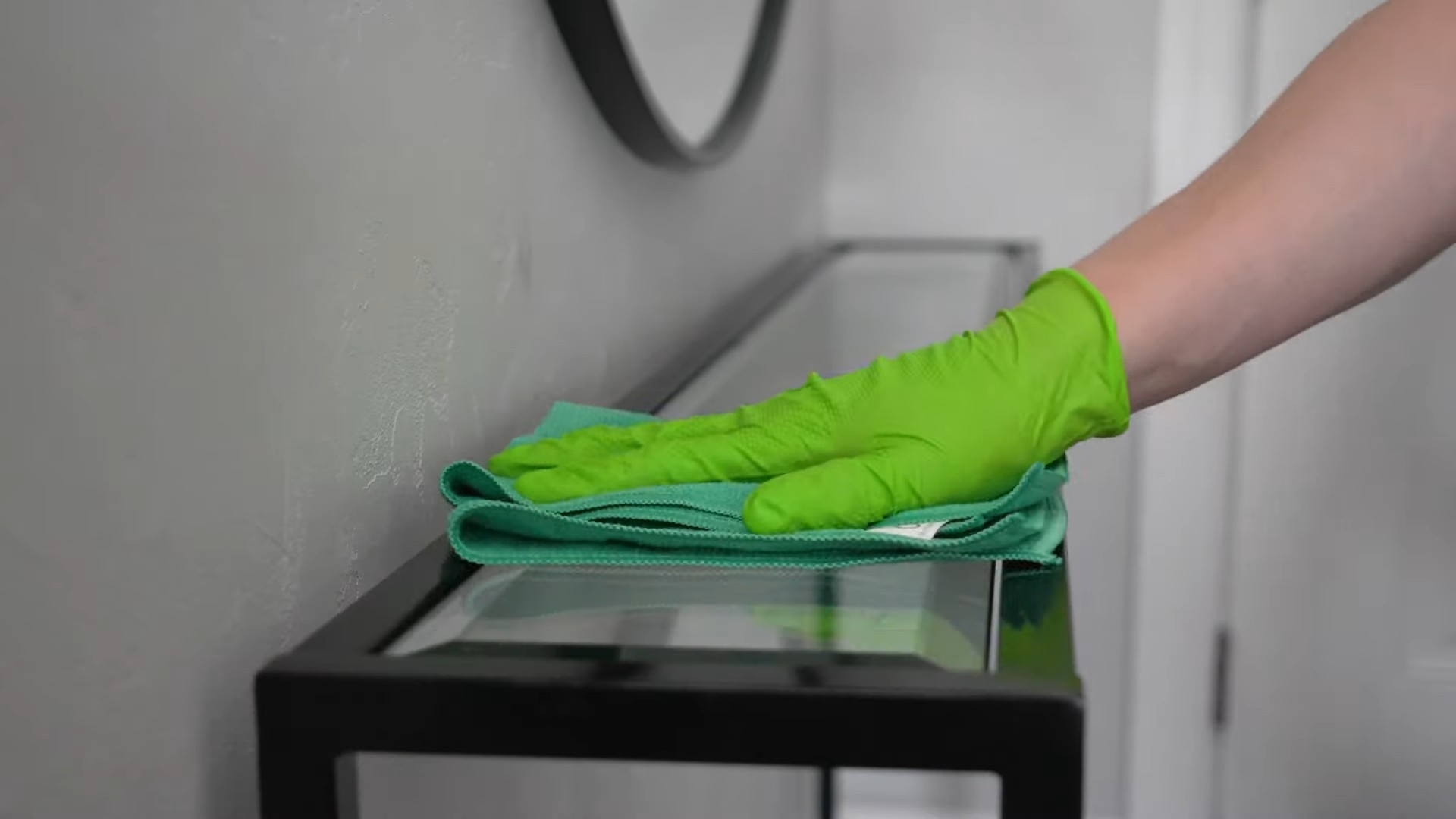
DIY Alcohol-Based Cleaners: Your Guide to Sparkling Clean!
Hey there, fellow DIY enthusiasts! I’m so excited to share my favorite recipes for alcohol-based cleaners. They’re incredibly versatile, effective, and a fantastic way to save money while reducing your reliance on harsh chemicals. Plus, they’re super easy to make! Let’s dive in!
Why Alcohol?
Before we get started, let’s talk about why alcohol is such a cleaning superstar. Isopropyl alcohol (also known as rubbing alcohol) is a fantastic disinfectant, degreaser, and solvent. It evaporates quickly, leaving surfaces streak-free and sparkling. It’s also effective against many common household germs. Just remember to use it safely and avoid mixing it with bleach or ammonia.
Safety First!
Always remember safety when making and using any DIY cleaner.
* Ventilation: Work in a well-ventilated area. Open windows or turn on a fan.
* Gloves: Wear gloves to protect your skin, especially if you have sensitive skin.
* Eye Protection: Consider wearing eye protection, especially when mixing ingredients.
* Storage: Store your homemade cleaners in labeled spray bottles, out of reach of children and pets. Clearly label the bottle with the contents and date.
* Mixing: Never mix alcohol with bleach or ammonia, as this can create dangerous fumes.
* Flammability: Alcohol is flammable, so keep it away from open flames and heat sources.
Choosing Your Alcohol: Isopropyl Alcohol vs. Ethanol
You’ll primarily be using either isopropyl alcohol or ethanol (grain alcohol) for these recipes. Here’s a quick breakdown:
* Isopropyl Alcohol (Rubbing Alcohol): This is the most common and readily available option. Look for a concentration of 70% or higher for effective disinfecting. I usually opt for 91% when I can find it.
* Ethanol (Grain Alcohol): This is a more natural option, often derived from corn or other grains. It’s generally considered safer for use around food preparation areas, but it can be more expensive. Make sure it’s denatured (meaning it has additives that make it undrinkable) to avoid taxes and regulations.
Recipe 1: All-Purpose Alcohol Cleaner
This is my go-to cleaner for almost everything! It’s great for countertops, sinks, bathroom fixtures, and even glass.
Ingredients:
* 1 cup Isopropyl Alcohol (70% or higher)
* 1 cup Water (distilled is best, but tap water works too)
* 10-20 drops Essential Oil (optional, for fragrance – I love lemon, lavender, or tea tree)
* Spray Bottle
Instructions:
1. Combine Ingredients: In a clean spray bottle, combine the isopropyl alcohol and water.
2. Add Essential Oils (Optional): If you’re using essential oils, add them to the mixture.
3. Shake Well: Secure the spray bottle lid and shake well to combine all the ingredients.
4. Label: Label the bottle clearly with the contents and date.
5. Use: Spray the cleaner onto the surface you want to clean and wipe with a clean cloth or paper towel.
Recipe 2: Glass and Mirror Cleaner
Say goodbye to streaks! This cleaner leaves glass and mirrors sparkling clean.
Ingredients:
* 1/2 cup Isopropyl Alcohol (70% or higher)
* 1/2 cup Water (distilled is best)
* 1 tablespoon White Vinegar (helps cut through grime)
* Spray Bottle
Instructions:
1. Combine Ingredients: In a clean spray bottle, combine the isopropyl alcohol, water, and white vinegar.
2. Shake Well: Secure the spray bottle lid and shake well to combine all the ingredients.
3. Label: Label the bottle clearly with the contents and date.
4. Use: Spray the cleaner onto the glass or mirror and wipe with a clean microfiber cloth. Microfiber cloths are key to streak-free results!
Recipe 3: Disinfecting Wipes
These are perfect for quick cleanups and disinfecting surfaces.
Ingredients:
* 1 cup Isopropyl Alcohol (70% or higher)
* 1/2 cup Water (distilled is best)
* 1 tablespoon Dish Soap (optional, for extra cleaning power)
* Roll of Paper Towels (choose a strong, absorbent brand)
* Airtight Container (like an old wipes container or a plastic container with a lid)
Instructions:
1. Prepare the Paper Towels: Remove the cardboard core from the roll of paper towels.
2. Cut the Roll (Optional): If your container is too small, you may need to cut the roll of paper towels in half with a serrated knife.
3. Combine the Cleaning Solution: In a bowl, combine the isopropyl alcohol, water, and dish soap (if using).
4. Pour the Solution: Place the paper towel roll into the airtight container. Slowly pour the cleaning solution over the paper towels, making sure to saturate them evenly.
5. Let it Absorb: Allow the paper towels to absorb the solution for about 5-10 minutes.
6. Pull from the Center: Once the solution is absorbed, pull a sheet from the center of the roll.
7. Label: Label the container clearly with the contents and date.
8. Use: Use the wipes to clean and disinfect surfaces.
Recipe 4: Electronics Cleaner
This gentle cleaner is safe for screens, keyboards, and other electronic devices.
Ingredients:
* 1/2 cup Isopropyl Alcohol (70% or higher)
* 1/2 cup Distilled Water
* Microfiber Cloth
* Spray Bottle (optional, but helpful)
Instructions:
1. Combine Ingredients: In a clean spray bottle (or a small bowl), combine the isopropyl alcohol and distilled water.
2. Dampen the Cloth: Lightly dampen a microfiber cloth with the cleaning solution. Do not spray directly onto the electronic device!
3. Wipe Gently: Gently wipe the surface of the electronic device with the damp cloth.
4. Dry with a Clean Cloth: Use a clean, dry microfiber cloth to dry the surface.
Important Note: Always unplug electronic devices before cleaning them. Avoid getting any liquid inside the device.
Recipe 5: Shoe Deodorizer Spray
This spray will help eliminate odors and keep your shoes fresh.
Ingredients:
* 1/2 cup Isopropyl Alcohol (70% or higher)
* 1/2 cup Water
* 10-15 drops Tea Tree Essential Oil (known for its antibacterial and antifungal properties)
* Spray Bottle
Instructions:
1. Combine Ingredients: In a clean spray bottle, combine the isopropyl alcohol, water, and tea tree essential oil.
2. Shake Well: Secure the spray bottle lid and shake well to combine all the ingredients.
3. Label: Label the bottle clearly with the contents and date.
4. Use: Spray the inside of your shoes with the deodorizer spray. Allow them to air dry completely before wearing them.
Recipe 6: Hand Sanitizer
With the right ingredients, you can make your own effective hand sanitizer.
Ingredients:
* 2/3 cup Isopropyl Alcohol (91% or higher)
* 1/3 cup Aloe Vera Gel (to help moisturize your hands)
* 5-10 drops Essential Oil (optional, for fragrance – lavender or tea tree are good choices)
* Small Bottle with a Pump or Squeeze Top
Instructions:
1. Combine Ingredients: In a bowl, combine the isopropyl alcohol and aloe vera gel.
2. Add Essential Oils (Optional): If you’re using essential oils, add them to the mixture.
3. Mix Well: Stir well to combine all the ingredients.
4. Transfer to Bottle: Pour the mixture into a small bottle with a pump or squeeze top.
5. Label: Label the bottle clearly with the contents and date.
6. Use: Apply a small amount to your hands and rub them together until dry.
Important Note: This recipe is based on guidelines from the World Health Organization (WHO). Make sure to use at least 60% alcohol concentration for effective sanitization.
Troubleshooting and Tips
* Cloudy Cleaner: If your cleaner looks cloudy, it could be due to hard water. Try using distilled water instead.
* Strong Alcohol Smell: The alcohol smell will dissipate quickly as it evaporates. If you’re sensitive to the smell, add more essential oils.
* Residue: If you’re noticing residue after cleaning, you may be using too
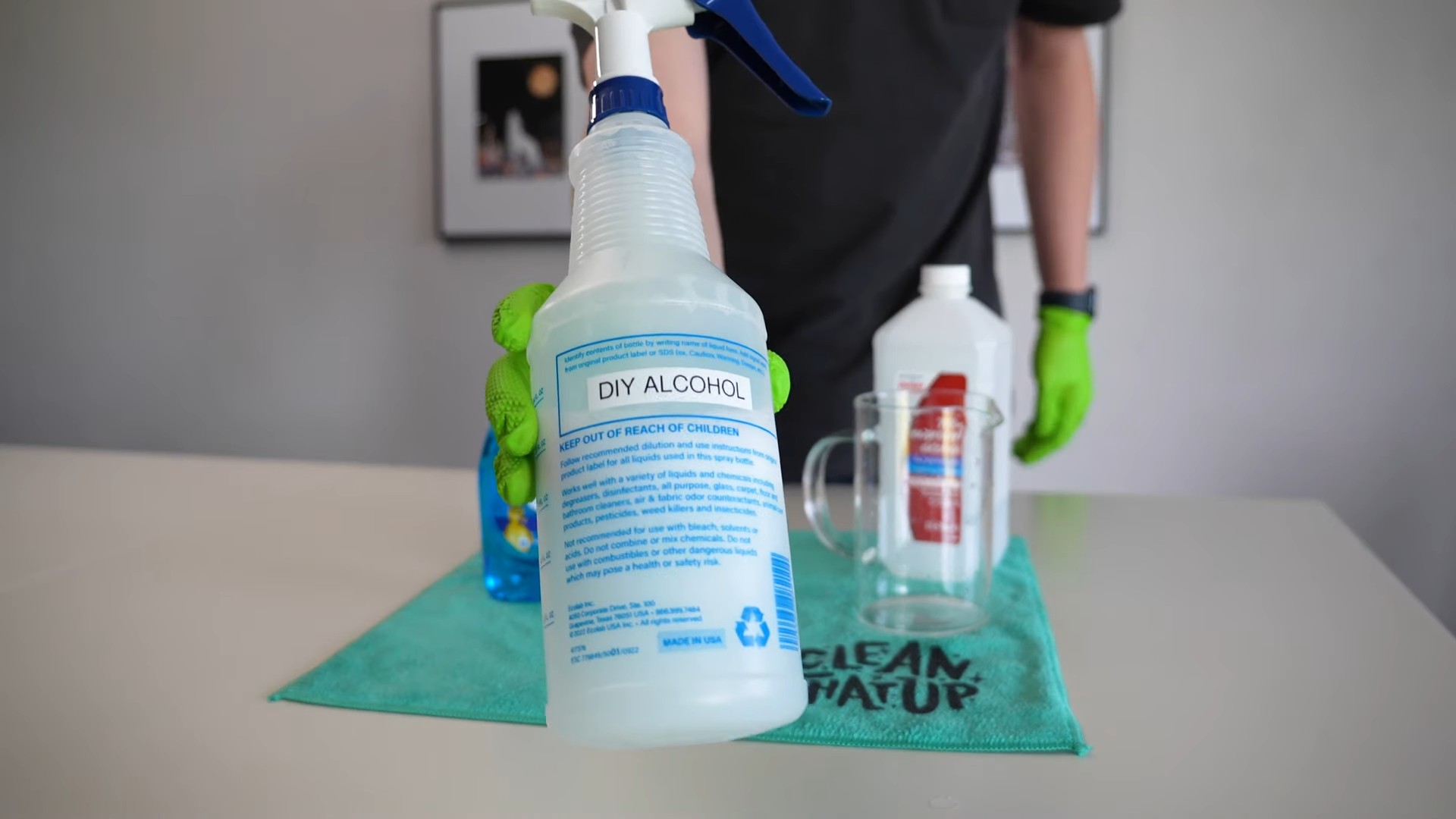
Conclusion
So, there you have it! Creating your own alcohol based cleaners is not only incredibly simple, but it’s also a game-changer for your cleaning routine. We’ve walked you through the process, highlighting the cost-effectiveness, the eco-friendly benefits, and the sheer versatility of these homemade solutions. Forget shelling out big bucks for commercial cleaners packed with harsh chemicals and questionable ingredients. With just a few readily available supplies, you can whip up powerful and effective cleaners tailored to your specific needs.
Why is this DIY trick a must-try? Because it puts you back in control. You know exactly what’s going into your cleaners, eliminating the worry about hidden toxins and allergens. Plus, you can customize the scent and strength to your liking. Imagine a sparkling clean home, infused with the refreshing aroma of your favorite essential oils, all while knowing you’re doing your part for the environment.
But the benefits don’t stop there. Think about the money you’ll save! Store-bought cleaners can be surprisingly expensive, especially if you’re buying specialized products for different surfaces. With this DIY approach, you’re using inexpensive ingredients to create multiple cleaning solutions, significantly reducing your household expenses.
Ready to take it to the next level? Consider these variations:
* **Citrus Power:** Infuse your alcohol based cleaner with citrus peels (lemon, orange, grapefruit) for an extra boost of cleaning power and a delightful, zesty scent. Simply add the peels to the alcohol and let it steep for a week before straining and using.
* **Herbal Infusion:** Experiment with different herbs like lavender, rosemary, or thyme to create unique and aromatherapeutic cleaners. Follow the same steeping process as with citrus peels.
* **Vinegar Boost:** For extra grime-fighting power, add a small amount of white vinegar to your alcohol based cleaner. Be cautious when using vinegar on certain surfaces like marble or granite.
* **Essential Oil Blends:** Create custom scent blends using your favorite essential oils. Experiment with combinations like lavender and tea tree for a calming and antibacterial cleaner, or lemon and eucalyptus for an invigorating and disinfecting spray.
We’re confident that once you try making your own alcohol based cleaners, you’ll never go back to store-bought alternatives. It’s a simple, effective, and rewarding way to keep your home clean and healthy.
So, what are you waiting for? Gather your supplies, follow our easy instructions, and experience the magic of DIY cleaning. We’re eager to hear about your experiences! Share your tips, variations, and success stories in the comments below. Let’s build a community of DIY cleaning enthusiasts and inspire others to embrace a more sustainable and cost-effective way to keep their homes sparkling clean. Don’t forget to tag us in your social media posts using #DIYCleaners and #AlcoholBasedCleaners. We can’t wait to see what you create!
FAQ
Frequently Asked Questions About DIY Alcohol Based Cleaners
We understand you might have some questions before diving into making your own alcohol based cleaners. Here are some of the most common questions we receive, along with detailed answers to help you get started with confidence:
1. What type of alcohol should I use?
The best type of alcohol to use for cleaning is isopropyl alcohol (also known as rubbing alcohol) with a concentration of 70% or higher. A higher concentration is more effective at disinfecting. You can typically find isopropyl alcohol at your local pharmacy or grocery store. Avoid using denatured alcohol, as it contains additives that can be harmful or leave a residue.
2. Can I use vodka instead of isopropyl alcohol?
Yes, you can use vodka as an alternative to isopropyl alcohol, but it’s important to choose a vodka that is at least 80 proof (40% alcohol). While vodka is a natural disinfectant, it’s not as potent as isopropyl alcohol, so it might not be as effective for killing all germs and bacteria. However, it’s a good option for light cleaning and deodorizing, especially if you’re sensitive to the strong smell of isopropyl alcohol.
3. Are alcohol based cleaners safe to use on all surfaces?
While alcohol based cleaners are generally safe for most surfaces, it’s always a good idea to test them in an inconspicuous area first, especially on delicate or porous materials like wood, leather, or painted surfaces. Avoid using alcohol based cleaners on acrylic or polycarbonate plastics, as they can cause damage. For surfaces like granite or marble, use alcohol based cleaners sparingly and dilute them with water to prevent etching.
4. How do I store my homemade alcohol based cleaners?
Store your homemade alcohol based cleaners in a clean, airtight spray bottle or container. Label the container clearly with the contents and date. Keep the cleaners out of reach of children and pets. Store them in a cool, dark place away from direct sunlight and heat. Properly stored, your alcohol based cleaners should last for several months.
5. Can I add essential oils to my alcohol based cleaners?
Yes, adding essential oils to your alcohol based cleaners is a great way to enhance their cleaning power and add a pleasant scent. Some essential oils, like tea tree, eucalyptus, and lavender, have antibacterial and antiviral properties. When adding essential oils, use them sparingly, as they are highly concentrated. A few drops per cup of alcohol based cleaner is usually sufficient. Be sure to choose essential oils that are safe for the surfaces you’ll be cleaning.
6. Are alcohol based cleaners effective against viruses like the flu or COVID-19?
Yes, alcohol based cleaners with a concentration of at least 70% alcohol are effective against many viruses, including the flu and COVID-19. When using alcohol based cleaners for disinfection, make sure to apply them to the surface and allow them to remain wet for at least 30 seconds to ensure proper contact time. Always follow the guidelines provided by health organizations like the CDC for effective disinfection practices.
7. Can I use alcohol based cleaners to clean electronics?
Yes, you can use alcohol based cleaners to clean electronics, but it’s crucial to do so carefully. Always turn off and unplug the electronic device before cleaning. Use a microfiber cloth lightly dampened with an alcohol based cleaner to wipe down the surface. Avoid spraying the cleaner directly onto the device, as this could damage the internal components. Never use alcohol based cleaners on screens, as they can damage the coating. Instead, use a screen-specific cleaner.
8. What are the benefits of using alcohol based cleaners compared to commercial cleaners?
There are several benefits to using alcohol based cleaners compared to commercial cleaners:
- Cost-effective: Alcohol and other ingredients are generally inexpensive.
- Eco-friendly: You avoid harsh chemicals and reduce plastic waste.
- Customizable: You can tailor the scent and strength to your preferences.
- Safer: You control the ingredients and avoid potentially harmful chemicals.
9. What safety precautions should I take when making and using alcohol based cleaners?
When making and using alcohol based cleaners, it’s important to take the following safety precautions:
- Work in a well-ventilated area.
- Avoid inhaling the fumes.
- Wear gloves to protect your skin.
- Keep alcohol based cleaners away from open flames and heat sources, as they are flammable.
- Store alcohol based cleaners out of reach of children and pets.
10. Can I mix alcohol based cleaners with other cleaning products?
No, it’s generally not recommended to mix alcohol based cleaners with other cleaning products, especially bleach. Mixing alcohol with bleach can create toxic fumes that can be harmful to your health. Always use alcohol based cleaners on their own and avoid combining them with other chemicals.

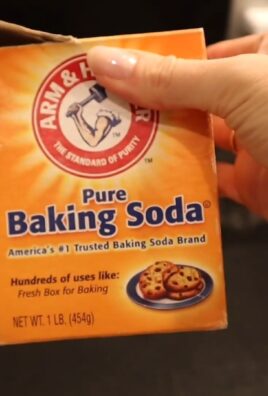
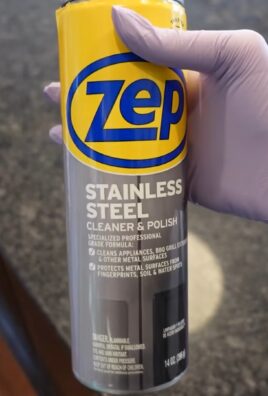
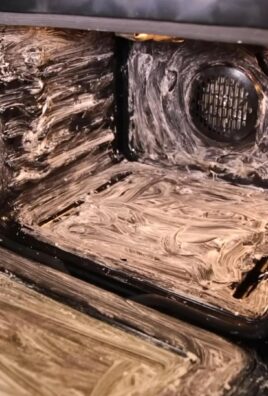
Leave a Comment